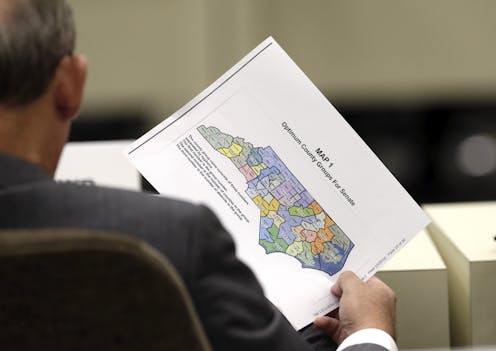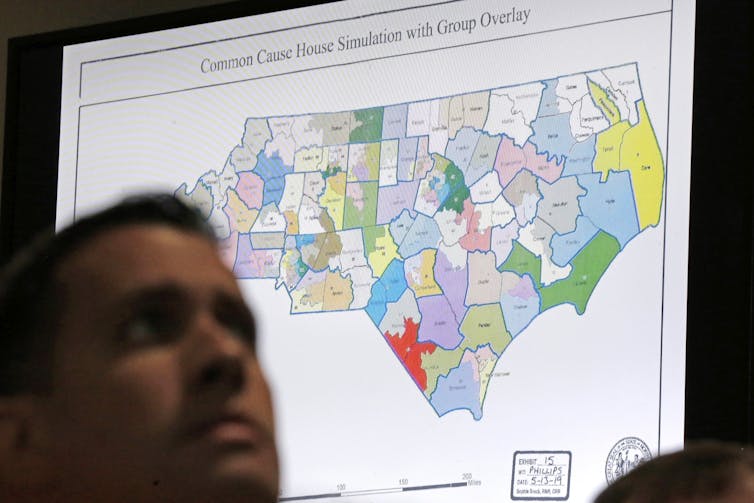
For months, legislators, legal scholars and people simply interested in democracy and elections were fixated on a case before the Supreme Court, Moore v. Harper. Those following the case, which asked the justices to rule on the “independent state legislature doctrine,” have held their collective breath awaiting the outcome, which could have changed fundamental aspects of U.S. elections and politics.
Henry L. Chambers Jr., a law professor at the University of Richmond, wrote earlier for The Conversation about the case, saying “Adoption of a strong independent state legislature doctrine would leave partisan gerrymandering unregulated at both the state and federal levels. State legislatures, unconstrained by state law, could then create aggressively gerrymandered congressional districts, possibly leading to an ever more partisan Congress with accompanying gridlock and policy failures.”
We asked Chambers to help readers understand the court’s opinion, issued on June 27, 2023.
What question did the Supreme Court answer in this opinion?
The court considered whether a state legislature could have the last word, with no review by state courts, regarding gerrymandered congressional districts they created. State legislatures have always been bound by the U.S. Constitution and by federal laws, so they had to draw lines consistent with the federal Voting Rights Act, for example. But the question was whether a state legislature could draw whatever congressional districts it wanted without review by state courts under state law. If so, state legislatures might also have more freedom to affect the choice of state electors in presidential elections.
At issue was a legal theory called the “independent state legislature doctrine,” which the court considered in a dispute over gerrymandered North Carolina congressional districts. In early 2022, North Carolina state courts found the Legislature violated the state constitution when it drew congressional districts favoring Republicans. The Legislature claimed the U.S. Constitution gives it authority, unfettered by state courts’ interpretation of the state constitution or laws, to regulate congressional elections, and asked the Supreme Court to agree.
The court did not agree.
In cases that involve the legislative action, courts typically consider whether the legislature has contravened state law. If the legislature has, it has made a mistake, and the legislative action tends to be reversed.
This decision merely reiterates what most people always thought the law was: Legislatures cannot legislate in ways that are inconsistent with the law that governs their actions and their state. This conclusion seems obvious, like saying the sky is blue or water is wet.
Does this decision apply only to partisan gerrymandering by state legislatures?
This case focused on partisan gerrymandering of congressional districts. However, it may apply more generally to rules for congressional elections, such as where, when and how such elections will be run. If the state constitution explains how congressional elections will be run, the state legislature must abide by those provisions.
What happens next in terms of partisan gerrymanders drawn by state legislatures?
Partisan gerrymanders are subject only to state constitutional and statutory law – the written laws enacted by the legislature. In the 2019 ruling, Rucho v. Common Cause, the Supreme Court deemed partisan gerrymandering a political question, not subject to regulation by the federal Constitution. In that ruling, the court noted state constitutional and statutory law could be used to stop partisan gerrymandering.
However, states need not regulate partisan gerrymandering. A state constitution may allow partisan gerrymandering by failing to prohibit it, essentially saying, “The people don’t care about partisan gerrymandering.”
Racial gerrymandering is still subject to regulation by the U.S. Constitution, federal law, such as the Voting Rights Act, and state law.

Now that the court has clarified that a legislature’s congressional redistricting is subject to review by state courts, the issue will become whether a state court has appropriately interpreted state statutory law or state constitutional law if it strikes down a congressional redistricting plan.
If a court interprets state law reasonably in invalidating a redistricting plan, it acts appropriately. If a court interprets state law too aggressively in invalidating a redistricting plan, it invades the legislature’s prerogatives.
Federal courts will decide when the state courts have gone too far. The less obvious the interpretation used by the court to limit the state legislature, the less likely federal courts will allow that interpretation to constrain the legislature. However, the Supreme Court provided no guidance in this decision on when state courts have gone too far.
Will this ruling affect the 2024 presidential election?
Had the court decided the case differently, bedlam could have ensued. Legislatures might have attempted to circumvent state law that defines how presidential electors are chosen.
Many folks argue such chicanery could never happen, because once presidential electors are chosen on Election Day, then that’s it. But if the court had suggested a legislature is not bound by its state constitution, some people might make arguments to sow discontent during the weeks between the election and the inauguration.
Other safeguards might have stopped the harm, but the fear of trouble would have been real.
Fortunately, that has been avoided.
This story includes material from an earlier story on the case by the same author.
Henry L. Chambers Jr. does not work for, consult, own shares in or receive funding from any company or organization that would benefit from this article, and has disclosed no relevant affiliations beyond their academic appointment.
This article was originally published on The Conversation. Read the original article.







